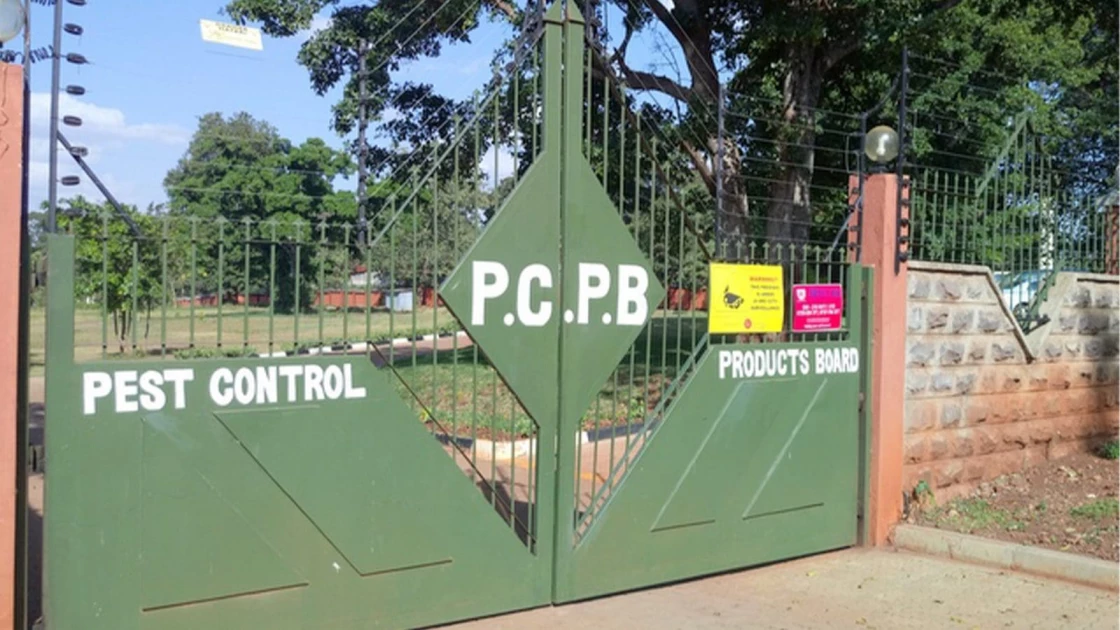Gov't dismisses report showing Kenyans are consuming toxic chemicals in foodstuffs

Entrance to the Pest Control Products Board (PCPB) offices.

Audio By Vocalize
The government’s pesticides regulator has picked a new fight with scientists, terming as misleading a recent report with far-reaching implications on the use of Ksh.10.7 billion worth of carcinogenic pesticides by farmers in Kenya.
The Pest Control Products Board (PCPB) says the report
released last month by Heinrich Boll Stiftung, which found farmers,
horticultural workers, and open-source water users exposed to toxic pesticides,
does not hold any water.
The board’s chief executive officer Fredrick Muchiri
maintains that the recommended ban on pesticide importation, though still under
discussion at the World Trade Organisation (WTO), threatens Kenya’s food
security.
“Banning pesticide products would deny millions of Kenyans
their right to food. PCPB therefore encourages the crop protection industry to
continue innovating in plant science to develop new and improved crop
protection solutions,” Mr Muchiri said.
Muchiri told journalists at a press conference that the
government has been keen on allowing importations of agrochemicals in adherence
to the set policy guidelines.
“Kenya adheres to international conventions and protocols,
including the Rotterdam, Basel, and Stockholm conventions,” Mr Muchiri said
dismissing the availability of traces of harmful chemicals on sukumawiki,
tomatoes, potatoes, and other foodstuffs available on markets.
Last month, Heinrich Boll Stiftung, an environment and food
security lobbyist, released data showing that Kenyans are consuming food
containing residues of pesticides banned in Europe in 2007 but sold to Kenyan
farmers.
Muchiri however, says farmers are harvesting crops that have
freshly sprayed pesticides, insinuating that farmers are not well trained on
the best practices on the agrochemicals use.
“We are harvesting crops even before the sprayed chemicals
are properly broken down, hence the chances of having higher residue levels in
our produce than the expected levels,” he said.
The September report dubbed Toxic Business: Highly
Hazardous Pesticides in Kenya, revealed that in a batch of 310 pesticides
investigated, 76 percent were found to be highly toxic while 44 percent were
banned in other countries.
Substances such as chlorpyrifos, acetochlor, glyphosate,
mancozeb and chlorothalonil have been found in the analysis, the report shows.
“Out of the 310 pesticide products used, only six are insect
pest control biopesticides, and only one biopesticide commonly used to control
fungal diseases. Sustainable biopesticides account for a mere two percent of
the total pesticide volume used in Kenya, while hazardous pesticides account
for 76 percent.
“Highly Hazardous Pesticides are priced lower per hectare
compared to the biopesticide which is majorly used on beans produced for export
to the European market,” reads part of the report.
Kenya in the recent past, has been dealing with other
hazardous components, including, carbosulfan a substance known to damage
critical human organs.
According to the World Health Organisation (WHO), human
exposure to carbosulfan leads to liver and kidney failure. Additionally, humans
also tend to have corroded omental fat layering and peripheral fat, which are
key in protecting the inner intestinal linings.
Glyphosate, despite WHO and the UN’s Food and Agricultural
Organisation (FAO) giving it a clean bill of health on water contamination, and
its carcinogenic tendencies to humans according to a 2016 report by the
International Agency for Research on Cancer (IARC), was also found in traces in
analyzed pesticides.
Citizen Digital has established that most
of the faulted brand owners constitute makers of soluble concentrate
non-selective foliar and systemic herbicides with a wetting agent that are used
in agriculture, horticulture, forestry, industrial, recreational, and weed
control practices. Over 73 multinational agrochemical companies have been cited
in the toxicity importation saga.
Another harmful chemical chlorpyrifos, for example, despite
being banned in the US over glaring effects, is a pesticide used to control
aphids in wheat-growing regions.
This is despite being scientifically proven to negatively
affect the nervous systems in children. It has also been linked to destructive
effects on the structure of the brain, acute leukemia in children, damage to
the heart and poisoning of human blood. Farmers using it without proper
protective gear have been worst affected.
Moreover, chlorpyrifos is also extremely toxic to fish yet a
study conducted by researchers in Lake Naivasha found chlorpyrifos levels to be
way above the recommended one in the water.
Coincidentally, chlorpyrifos is still approved for
controlling aphids on flowers, mostly grown around the Lake Naivasha region.
The continued use of chlorpyrifos endangers the lives of Kenyans who depend on
the lake for water and fish needs.
Today, farmers in Kenya are continuously using thousands of
tons of toxic pesticides in their maize, wheat, coffee, potatoes, and tomato
plantation fields, especially in the Rift Valley, Central, Western and Nyanza
regions.
Most of the pesticides easily available over agrovet
counters, have been proven to cause cancer or genetic defects, impair
fertility, or harm unborn children, and the report recommends a more stringent
approach to ending this.
Kenyan farmers are spending up to USD 72.7 million annually
(approx. Ksh.10.7 billion) to sustain the booming import business of killer
chemicals, as regulators fall short of cracking the whip. Imported pesticides
and fungicides, the report shows, are used on over 20 percent of
agricultural land.


Leave a Comment